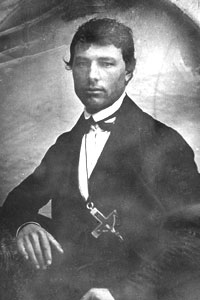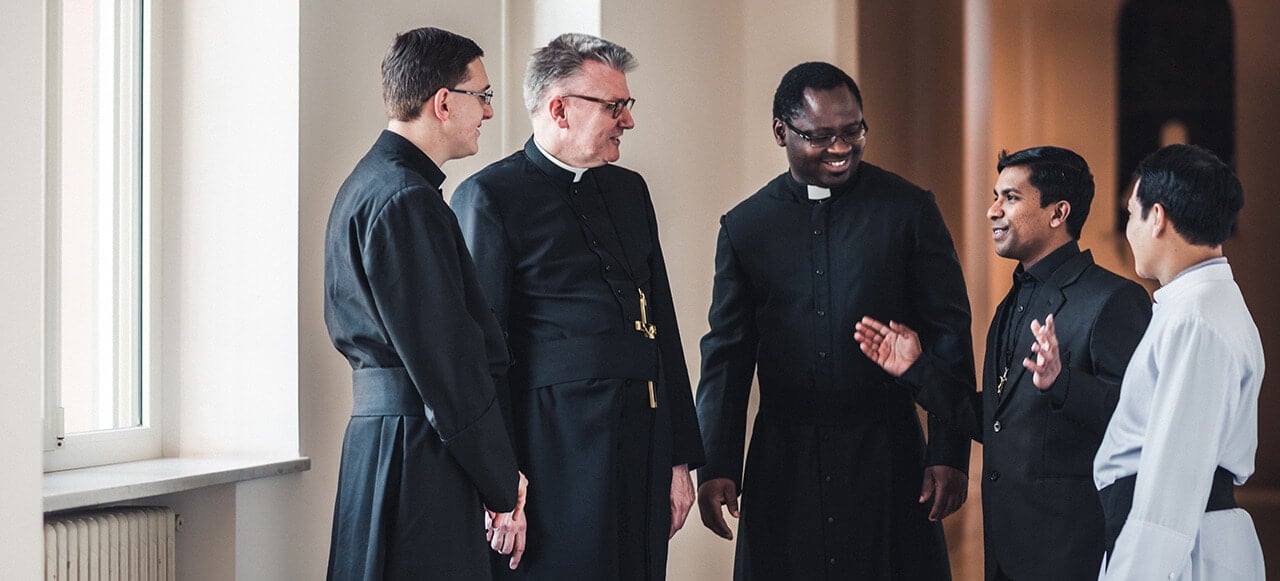
Pierre Bernard.
Let me tell you about the first brother in our Africa missions, a jack-of-all trades who had the reputation of being a saint. The Zulus called him “the little poor one.” He is Brother François Bernard.
He was born in Saint-Damien, in the diocese of Grenoble, France, in 1827. Until age eighteen he was not very faithful to his Christian duties. After hearing a sermon on the work of missionaries, he felt suddenly attracted by the vocation of catechist among non-Christians. Having received a favorable response to his aspirations from the Oblates of Mary Immaculate, he entered the Notre-Dame de l’Osier novitiate in September 1852. Meanwhile the Founder had just accepted a mission in Natal. He had Brother Bernard come to Marseilles and allowed him to take vows for five years, even though he had finished only seven months of novitiate. He assigned him as companion to Fr. Justin Barrêt and the deacon Joseph Gerard, who were to join Mgr. Jean-François Allard, the recently appointed Vicar Apostolic of Natal. After a long eight month voyage, the brother arrived in Africa. There was no lack of work but he had to put aside his ambitions of being a catechist. He was needed as cook, gardener, carpenter and errand-boy.
Four years later, he was sent to the Zulus, a hard and difficult mission that had just opened. He started building a Church. This work obliged him to go twelve miles to cut large trees that he must then transport with the help of oxen, “lions with horns” – as he called them – that often tried his patience.
Late one Saturday night, while on his way back to the mission for Sunday Mass, he had to descend a steep hill with a load. It overturned and the whole lot rolled down the slope. “My God, he exclaimed, save your workers; Blessed Virgin, protect us.” Almost at once the cart and the oxen ceased rolling: the damage was small. Bro. Bernard shook with emotion when telling the story two hours later. He saw a special protection from above in the event.
He was also responsible for providing food for the mission. Fortunately, he was an accomplished hunter. One day however he missed his shot at a wild goat; he wounded it in the leg and it was able to run away. It ran a long time on its broken bones with three long legs and “a short leg” that hampered it extremely. As he used everything to raise his spirit towards God, our good religious added, while bringing his trophy to the mission: “If we had as much energy to flee evil and to serve God as this poor creature had to flee from me, then we could become saints.”
A skillful carpenter, he built a kind of press for oil. While the oil ran out from one of these inventions he said: “This is how we must be pressed by the troubles of this world, so that, if there is something good in us, that little good can be turned into merits before God.”
Brother Bernard had entered the Congregation with the aim of one day becoming a catechist among the natives. You can imagine his joy when Bishop Allard put him in charge of a school in Basutoland. He had a great facility with languages. He had learned English and Portuguese from the sailors and the travelers on the ship. He quickly learned the languages of the Zulus and the Basotho while carrying out household chores with the natives of these two races. Thanks to his knowledge and tact, he had much influence on the youth entrusted to him.
The main concern of his existence was “the salvation of his soul and that of the non-Christians.” He was encouraged by these words, which he often repeated: “Bernard, why are you a religious? If you were to lose yourself after so many sacrifices!” This thought helped him bear all the difficulties that came with his vocation. He also drew courage from God in the Eucharist: “Our Lord present in the tabernacle does not ask these people who do not know him to come to pay him homage. But me, a religious, associated with these missionaries who work so much for them, should I not kneel often at the feet of this Divine Savior to ask him to have pity on these unfortunate creatures for which he poured out his blood?”
Brother Bernard died on January 15, 1889, at the age of sixty-two, after thirty-seven years of religious life. He is buried in Roma in what is today Lesotho.
André DORVAL, OMI
